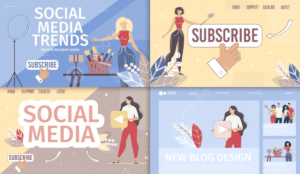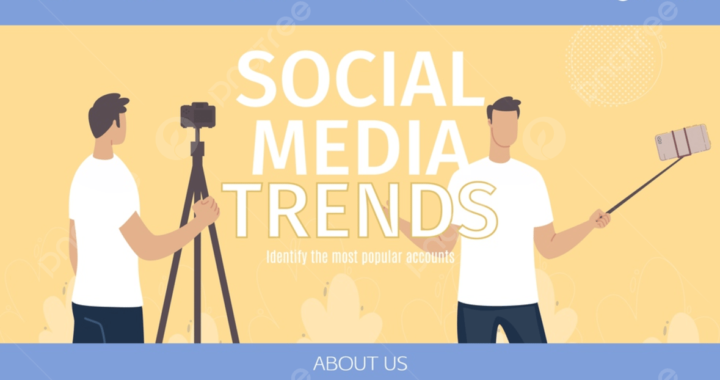Social media is an ever-evolving landscape, and each year brings fresh trends that redefine how brands, influencers, and users interact online. This year is no different, with several groundbreaking shifts that are reshaping engagement, content creation, and marketing strategies. Here are five social media trends dominating this year that businesses and content creators should pay attention to.
1. AI-Powered Content Creation and Personalization
Artificial Intelligence (AI) has revolutionized how content is created and consumed on social media. From AI-generated text and images to personalized recommendations, AI tools are making it easier for brands to create highly engaging content that resonates with their audience.
Chatbots and AI Assistants: Many brands now leverage AI-powered chatbots to enhance customer interactions on platforms like Facebook Messenger, WhatsApp, and Instagram DMs.
AI-Generated Visuals: Tools like MidJourney and DALL·E are helping creators design unique, high-quality images for social media posts.
Personalized Feeds: AI-driven algorithms tailor content to users based on their preferences, making social media more engaging and addicting than ever.
AI-Generated Captions and Copywriting: Tools like Chat GPT and Jasper AI help brands create engaging social media captions, blog posts, and ad copy effortlessly.
Automated Video Editing: AI-powered tools are streamlining the video editing process, making it quicker and more efficient for content creators.
As AI continues to advance, brands that leverage its capabilities will stay ahead in the competitive digital space, saving time while boosting creativity and engagement.
2. Short-Form Video Content Continues to Dominate
Short-form videos have been the reigning champions of social media for a while, and they show no signs of slowing down. Platforms like TikTok, Instagram Reels, and YouTube Shorts are experiencing rapid growth as users consume bite-sized content that is easy to digest and highly engaging.
Authenticity Over Perfection: Users favor raw, authentic content over highly polished, professional videos.
User-Generated Content (UGC): Brands are increasingly encouraging customers to create and share content featuring their products.
SEO for Short Videos: Optimizing video captions and descriptions with trending keywords is helping creators reach a wider audience.
Live Short-Form Content: TikTok and Instagram Live encourage real-time engagement, making interactions more dynamic and engaging.
Interactive Elements: Polls, Q&A sessions, and challenges integrated into short videos help brands and influencers build a stronger connection with their audience.
For businesses, investing in short-form video marketing can increase brand visibility, enhance engagement, and drive conversions. The demand for snackable, entertaining content means brands must focus on storytelling within a concise format.
3. The Rise of Social Commerce
Social commerce—selling products directly through social media platforms—is becoming a major force in e-commerce. Consumers no longer need to visit external websites to make a purchase; they can now shop seamlessly through their favorite social media apps.
Instagram and Facebook Shops: These features allow brands to set up online storefronts within social media platforms.
Live Shopping Events: Influencers and brands host live shopping sessions where followers can buy products instantly.
Augmented Reality (AR) Shopping: AR filters allow customers to try on products like makeup, clothing, and accessories before purchasing.
Influencer Marketing Integration: More brands are partnering with influencers who directly sell products through their social media pages.
Brands that optimize their social media profiles for shopping will see increased conversions and customer engagement. With the integration of AI-powered recommendations and real-time interactions, social commerce is rapidly transforming how people shop online.
4. The Emergence of Niche and Private Communities
While public platforms remain popular, users are shifting toward private and niche online communities where they can engage with like-minded people in a more controlled environment.
Exclusive Facebook Groups and Subreddits: More brands are creating private groups to foster deeper relationships with their audience.
Discord and Telegram Communities: Businesses and influencers are using these platforms to build dedicated fanbases.
Paid Membership and Subscription Models: Platforms like Patreon and Twitter Subscriptions allow creators to monetize exclusive content.
Brand-Led Micro-Communities: Companies are creating smaller, more focused communities around specific interests, products, or values.
Personalized Engagement: Brands are leveraging private messaging groups to offer VIP customer support and exclusive updates.
Consumers crave authentic, meaningful connections, and private communities help foster trust, loyalty, and engagement. Brands that cultivate these spaces will benefit from stronger relationships with their followers.
5. The Growing Importance of Social Media Ethics and Transparency
Consumers are becoming more aware of ethical concerns on social media, including data privacy, misinformation, and corporate responsibility. Brands that prioritize transparency and ethical practices will earn trust and credibility.
Authenticity Matters: Users demand more honesty from influencers and brands regarding sponsored content and paid partnerships.
Sustainable and Socially Responsible Branding: Consumers are drawn to companies that advocate for social causes and sustainability.
Privacy and Data Security: Users are increasingly cautious about how their data is being used, prompting social platforms to implement stricter policies.
AI and Deepfake Awareness: As AI-generated content becomes more sophisticated, users are demanding greater transparency regarding its use in social media marketing.
Combatting Fake News: Social platforms are enhancing their fact-checking mechanisms and algorithms to reduce misinformation and misleading content.
Businesses that align their social media strategies with ethical practices will build stronger and more meaningful relationships with their audience. Users are more likely to support brands that stand for transparency, fairness, and authenticity.
Conclusion
This year’s social media trends highlight the growing influence of AI, short-form videos, social commerce, private communities, and ethical engagement. Staying ahead of these trends is crucial for businesses, marketers, and content creators looking to thrive in the fast-paced digital world.
Adapting to these changes requires businesses to experiment with new tools, embrace community-driven interactions, and remain transparent in their messaging. By doing so, they can maximize their social media impact, increase brand loyalty, and create lasting connections with their audience.
The evolution of social media is inevitable, and the brands that continuously innovate and align with user expectations will be the ones that succeed. Whether through AI-powered content, immersive shopping experiences, or authentic storytelling, the key to success in social media this year lies in embracing these dominant trends.
